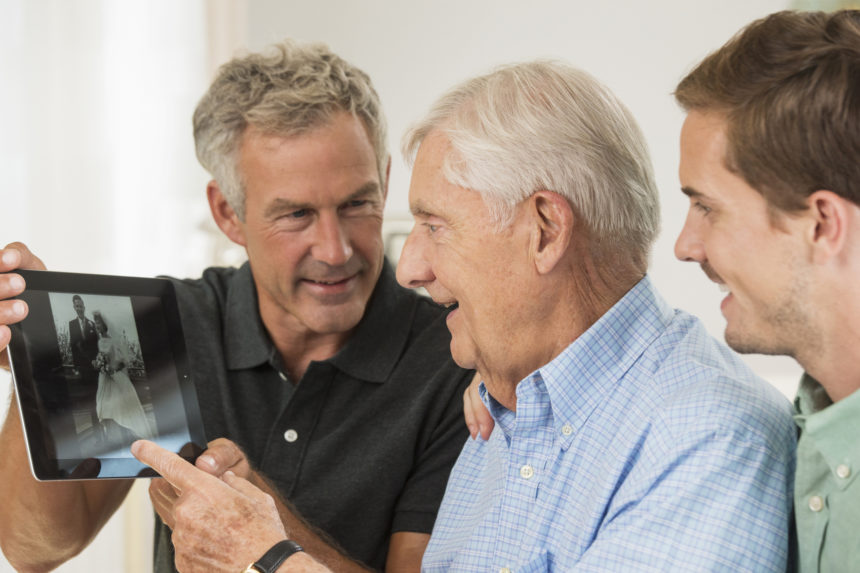
Vaccinations and a dramatic slowdown of COVID-19 infections and deaths led federal officials to significantly loosen guidelines regarding in-person nursing home visits Wednesday afternoon.
“Facilities should allow responsible indoor visitation at all times and for all residents, regardless of vaccination status of the resident, or visitor, unless certain scenarios arise that would limit visitation,” the Centers for Medicare & Medicaid Services said in a statement.
CMS issued the updated guidance in conjunction with the Centers for Disease Control and Prevention (CDC).
CMS said limitations on visits should be put in place for:
- Unvaccinated residents, if the COVID-19 county positivity rate is greater than 10% and less than 70% of residents in the facility are fully vaccinated;
- Residents with confirmed COVID-19 infection, whether vaccinated or unvaccinated, until they have met the criteria to discontinue transmission-based precautions; or
- Residents in quarantine, whether vaccinated or unvaccinated, until they have met criteria for release from quarantine.
“We acknowledge the toll that separation and isolation has taken,” CMS said. “We also acknowledge that there is no substitute for physical contact, such as the warm embrace between a resident and their loved one.”
If a resident is fully vaccinated, he or she “can choose to have close contact (including touch) with their visitor while wearing a well-fitting facemask. Regardless, visitors should physically distance from other residents and staff in the facility,” the agency added. Visitors do not have to show proof of vaccination or be tested before entering a facility.
“Outdoor visits are still preferred,” noted Jodi Eyigor, director of nursing home quality and policy for LeadingAge, on a conference call with members that was taking place as CMS issued its notice.
While precautions should still be routinely used during indoor visits — including masking of vaccinated residents and social distancing — some exceptions can be made.
“You can allow touch during a visit for fully vaccinated residents,” Eyigor said, adding that hand washing should be done immediately afterward.
The relaxation of visitation guidelines comes almost exactly a year after federal authorities first closed them down on March 13, 2020.
Now, during an outbreak, even if it’s a single case involving a resident or staff member, providers must suspend visitation until an entire round of outbreak testing is conducted. Visits may resume if testing shows the outbreak is contained; if not, providers must stop visits for 14 days after their last new case.
“None of the visitation requirements change your testing requirements,” Eyigor said. “You must continue to screen visitors and restrict visitors who have had contact with someone who has been exposed to COVID whether or not they’ve been vaccinated.”
Providers also still will be required to conduct routine testing of staff. The new guidance also says surveyors do not need to be vaccinated and must be admitted to facilities regardless of vaccination status.
While emphasizing that providers are still duty bound to maintain strong infection control practices in the days and months ahead, CMS officials stressed that the human burden needed to be eased.
“CMS recognizes the psychological, emotional and physical toll that prolonged isolation and separation from family have taken on nursing home residents, and their families,” said Lee Fleisher, MD, CMS Chief Medical Officer and Director of CMS’ Center for Clinical Standards and Quality. “That is why, now that millions of vaccines have been administered to nursing home residents and staff, and the number of COVID cases in nursing homes has dropped significantly, CMS is updating its visitation guidance to bring more families together safely.
“This is an important step that we are taking, as we continue to emphasize the importance of maintaining infection prevention practices, given the continued risk of transmission of COVID-19,” he added.
Visits for compassionate care, such as an end-of-life situation or a residents in decline or distress should be allowed “at all times for any resident (vaccinated or unvaccinated),” regardless of other scenarios, CMS said in a fact sheet. Facilities and visitors still should continue all infection prevention and control practices, however.
The nursing home guidance comes two days after federal authorities announced loosened recommendations for those in non-healthcare settings.
This is a developing story. Check back for frequent updates.



